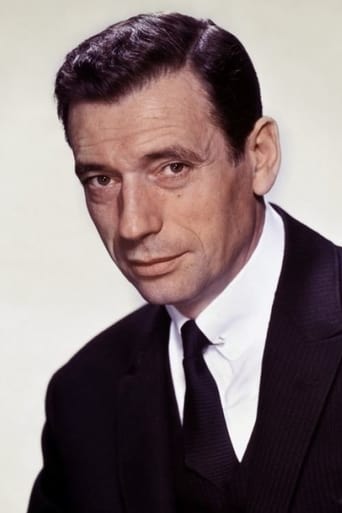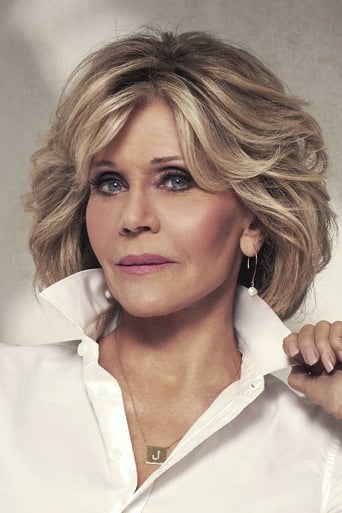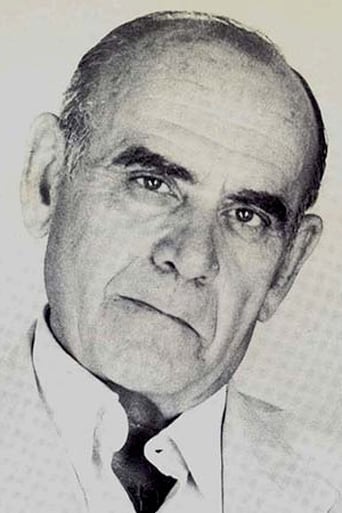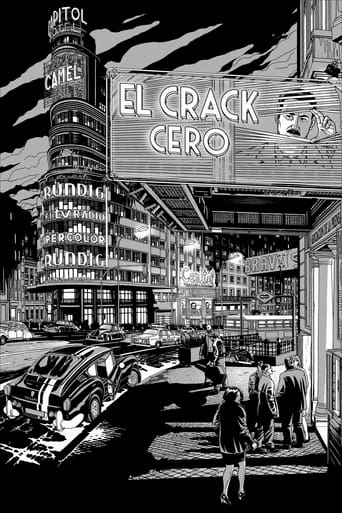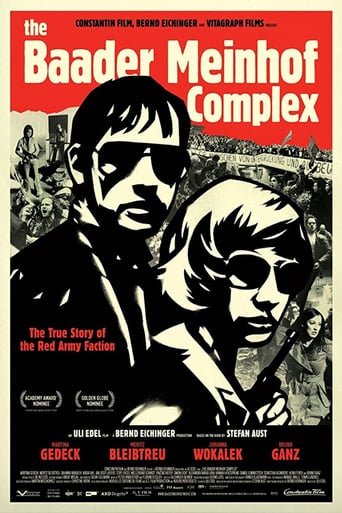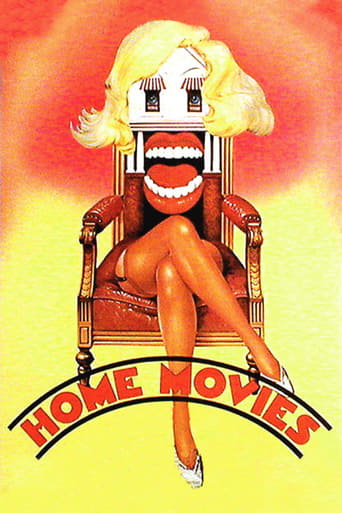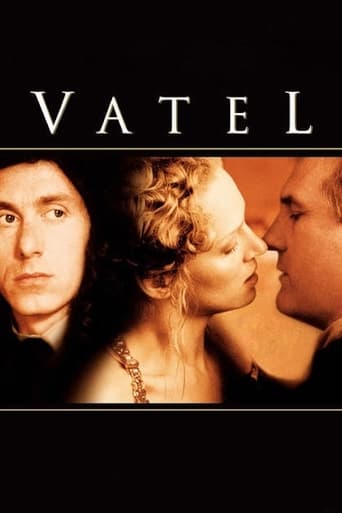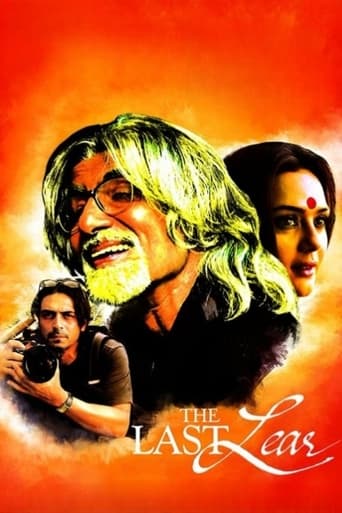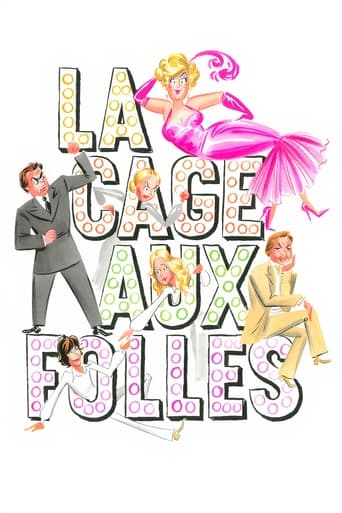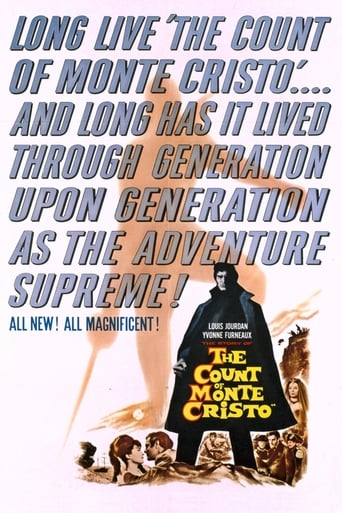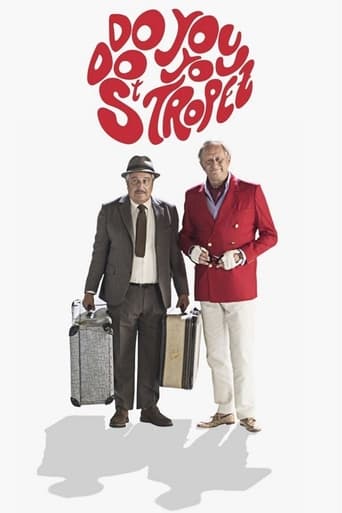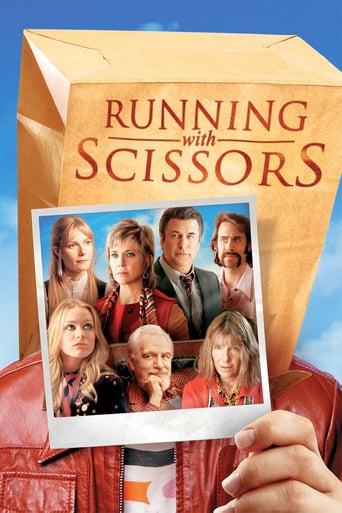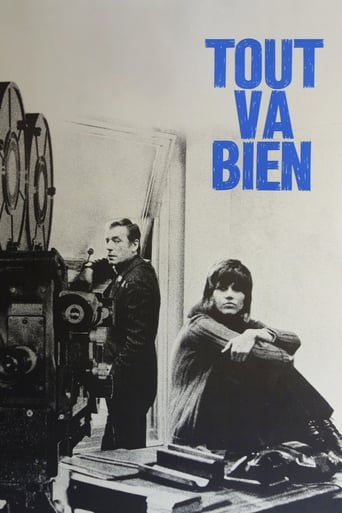
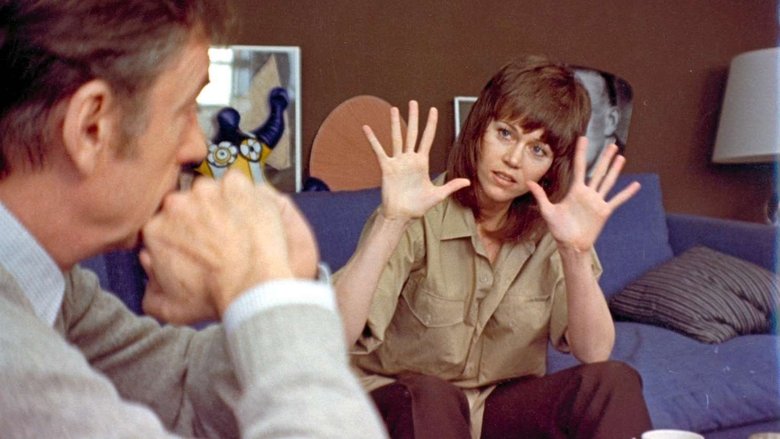
Tout Va Bien (1972)
A strike at a French sausage factory contributes to the estrangement of a married filmmaker and his reporter wife.
Watch Trailer
Cast
Similar titles
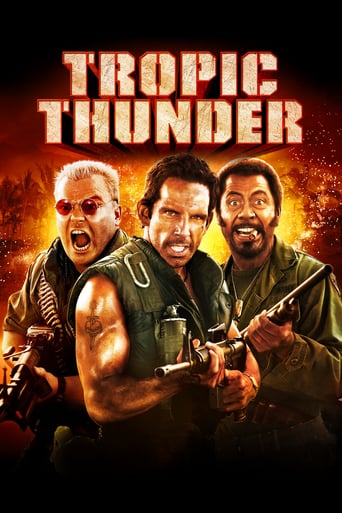
Reviews
The Worst Film Ever
I think this is a new genre that they're all sort of working their way through it and haven't got all the kinks worked out yet but it's a genre that works for me.
By the time the dramatic fireworks start popping off, each one feels earned.
Like the great film, it's made with a great deal of visible affection both in front of and behind the camera.
Most of the time, I do not watch Godard, because that would be maddening; instead, I roll up my sleeves and work at watching him. It's almost always rewarding, and it's much less frustrating than trying to remain entertained."Tout Va Bien" is not an entertainment – it's a sometimes funny look at how humanists deal with the aftermath of class struggle, the aftermath of the presence of the real possibility of change in society. Set and made in 1974, this film looks at the legacy of the student-led May 1968 Movement. What did this Spring of Revolution leave behind as seed, particularly for the upwardly mobile intellectuals who embraced its concepts without sacrificing their own materialism? To find out, we have to watch our hero and heroine, played by Yves Montand and Jane Fonda, as they negotiate their relationships with one another in the light of their politically committed past and the professionally unsatisfactory compromises that each of them are being asked to make in the present.The main action of the film is the seizure of a food factory by its workers, and the consequent detention of our couple together with the workers' intended hostage, the factory manager. Through this device, the film raises issues of workers' rights, women's rights and the role of trade unions in the free market workplace. It also allows us to see snippets of an actual production line, and memorable glimpses of our stars making sausages and chain-sawing through pig carcasses.It's very strange, but precisely because Montand and Fonda seem so cameo-esque in their execution of these tasks, the work itself becomes more tangible, more real. However, this is not to say that this film is a work of realism. Indeed, it's the opposite of that. The film itself begins with a series of shots showing the cheques that were written to fund it. Throughout the film, our couple remain "He" and "She". They have no other names. At times, they speak directly to the camera. Others in the story do the same. It is all part of a strategy to never hide the work's representational nature. This is, Godard says, a film, and films are made in order to look at issues. In turn, this honesty of approach, this confession that it is a performance that we are watching, allows us to concentrate on the questions raised rather more than the characters that raise them. That's okay, because it's not a film about them, it's a film about us. About you and me and this world. And though it was made nearly forty years ago, what it has to say about gender roles, power, economics and politics is as fresh as the blood on all their aprons.
Godard always makes me think. I'm never indifferent to what he does, with a few exceptions. But many times the excitement about a film by Godard comes in the days after i saw it. This is one of those cases.The setup is simple, he is working on the structural (re)invention of his own films. He probably was by than arrogant enough to believe he was working on the reinvention of the whole cinema (remember the "jean luc cinema godard" signature of Bande a part?). Well there are conclusions which came to affect other works by many other authors, but not always. I think this one is important as a milestone for Godard, in the great picture of his work and it is important to watch on the historical context of cinema than. Many things were happening in the beginning of the seventies, and the main issue was perhaps to clarify the meaning of cinema and its links to real life, the main question the nouvelle vague had raised but never satisfactory answered to that moment. So there are a few works from this period i think should be checked for they show different approaches from different contexts to a similar issue. Think about "F for fake" by Welles, "The conversation" by Coppola, "La nuit américaine" by Truffaut, a few years before Antonioni's Blow up. In the root of all this projects (and some others) is, to my view, this cinematic concern of understanding whether cinema represents life, stages life, or is pure fiction which may influence life. This is probably the least interesting answer of the works i mentioned, but it is still worth a look.The reason why i think this is less rewarding than the films i mentioned above is because Godard, at this point, tended to ruin partially his films by dulling the viewer with his childish half baked conceptions of political ideologies. So he doesn't focus so much on cinema as he does on politics. I like to believe that even than he had the notion of the lack of deepness in the ideas he depicts, but chose to understand that posture as a motivator of certain aesthetics conceptions. So, regarding cinema:The film is in itself a rough structure, which contains several rough structures inside. The result is that we are able to check the mechanics of all the issues we watch: film, politics, and personal relations. Of these three, the only one that matters is the issue film-making. All is denounced so, in the beginning, we have a shot in which someone signs checks to pay film-related services (photography, film, script, etc) followed by an off dialog translating a stylization of the beginning of the film making process. Than we get a beautiful hole sequence inside a factory. We see the factory as a section, so we are able to simultaneously get what happens in every division of it (this structural denouncement was to be used in different context by von Trier, with Dogville). Even before we are allowed to understand we are watching a set, never for a moment one believes to be watching a real location (the colors are those of the french flag). The performances by the workers are also ostensibly stagy, so one doesn't suspect we are watching real life being captured. So, fiction is announced. Like Truffaut in "la nuit américaine", Godard finally assumes that film has a kind of dynamics which has not that much to do with life, and the role of cinema is not to capture life, but to create a life of its own, which has roots in real world, but has its own inner laws.Than Godard ruins partially the experience. He assumes the political speech. He places still on the factory context several workers (actors performing workers, good to remember) unleashing terribly boring monologues (at least from by point of view, i'm not a May 68' guy, older folks please comment on this) concerning their rights and their complaints. He places the actors talking directly to the camera, assuming once more there is a filming being made. Later he even assumes we can make our own film, when he puts Montand talking side by side with a camera pointing at us.The third and clearly least worked out issue is the personal relation between Fonda and Montand. It is also told caring for the structure of the thing. So everything is stylish, cliché, but it is supposed to be like that. We end the film with possibilities on how their relation ends.This is a cinematic sketch, like the demo of a film. I like that attitude, i like the aspect of "unfinished" project, roughness, provisional look of the film. It's as if we were part of the process. And indeed we are.Oh and there is a shot, that alone makes this worth watching. The relatively famous shot on a supermarket. We have the camera moving for about 15 minutes over a straight line, we watch the normal life of a supermarket, stuff happening, a staged "ideological" fight. Just that. The camera comes and go, the line it follows is parallel to the line of register boxes which register the clients shopping. We see the things at the level of the registers box workers. It's just beautiful. It's cinema, maybe not the cinema of truth, but true cinema. Really.My opinion: 4/5
Godard uses Brechtian devices in this film to portray a left wing political message to his viewers. Thats just for a shorter briefing me lovelies!It says that I must ten lines so basically Brecht was a left wing theatre practitioner who did not believe that an audience should watch a film to be caught up in the action and escape reality. He instead believed it was a political tool and created his own "epic theatre". This theatre was developed to alienate the audience so that the audience would think "this is strange" and therefore remove themselves from the action to consider the meaning of the play. Devices from this theatre which are present in Godards films are the showing of props, narrative devices interjections (Godard interrupts to tell the audience the point of the film) placards and chanting.
Although I'm quite familiar with most of Jean-Luc Godard's career, there is that 1970s period where he completely abandoned commercialism in all its forms and made experimental political films with Jean-Pierre Gorin and others. Tout Va Bien is not an impossible work, but it is challenging and, even if you win that challenge, the rewards are fairly limited. But it's interesting work, and Godard's fractured cinematic imagination is definitely brilliant at times. The grocery store sequence near the end of the film is as cinematic ally accomplished and impressive as the tracking shot of the apocalyptic highway in Week-End. And I love the meta-cinematic material at the beginning, where the filmmakers discuss how they can make a political film about May '68 and how the movement has evolved in the following four years. Step on: hire some stars. With stars come money. Thus Yves Montand and Jane Fonda are recruited for that purpose. The longest segment of the film has the two stars trapped with the manager of a slaughterhouse as his workers bar him from leaving his office. Godard and Gorin have a set designed after that large-windowed apartment building in Tati's Playtime. Perhaps it is even the same exact set, remodeled a bit for the way they want to use it here? The new Criterion DVD includes a follow-up film, A Letter to Jane, which discusses the famous photograph of Fonda meeting with the Viet-Cong. It is nearly unwatchable, though, and I gave up after 15 or 20 minutes (it's 52 minutes of Godard and Gorin speechifying which is also prevalent (and hard to take) in Tout Va Bien, as well).
